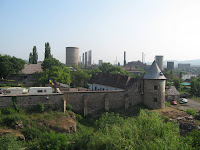As an outsider who nevertheless wishes to understand minutest details of Bulgarian life, I must admit to feeling confused about “a day of National Mourning.” It would be interesting not only to know the criteria on which decisions are made to nominate such a day, but also something about the expectations of public behavior.
Some years ago I arrived at the Burgas theatre, really looking forward to seeing a reputedly exciting new production. At the time the theatre was performing only one night a week, and this would be my only opportunity to see a Bulgarian play that year. Arriving at the square in front of the theatre, I was surprised to find it deserted. The theatre was dark. The doors were locked. I checked my ticket. I looked about. I hailed a passer- by. He shrugged at my ignorance. Didn’t I know that a day of National Mourning had been declared? Of course on such a day theatres would not be working.
It was the day after the bus crash in Montenegro, where a number of Bulgarian school-children died in a river while teachers stood on the bus roof and local heroic Moslem gypsies tried to save the drowning kids. So as I walked back through the town I indulged my feeling of guilt. Yes, I was frustrated and angry, that I had been denied my annual theatrical experience. But I should learn to respect another country’s culture. I passed the cinema. It was working. I passed restaurants and bars. They were not only working but heaving with customers. The monotonous voice of the September Cinema bingo caller could still be heard over the racket of hot pop-corn. Music spilled out from everywhere. On the main street, Bulgaria’s day of National Mourning was a day like any other.
So to this year, I had tickets for Shakespeare’s As You Like It. I am always excited by Bulgarian Shakespeare productions. Unhampered by historical reverence, they can make a sixteenth century text relevant, gripping and entertaining – even to a group of badly behaved school children.
“We’re off to the theatre!” I tell my neighbour on the stairs. She shakes her head doubtfully. “Today’s a day of National Mourning. Haven’t you heard about the crash at Yambol?” I confess ignorance and so learn about the sixteen pensioners killed in a bus with no brakes – a bus that had somehow escaped any kind of technical check for at least the last ten years.
My heart sinks. And this time I feel less guilty in expressing my frustration. If theatres closed in England every time there was a bad road accident, they’d go bankrupt. But it turned out As You Like It was not cancelled. We sat in a full auditorium but before the lights dimmed, an actor addressed us in solemn sonorous voice, apologizing for having to perform on such a day. “We are actors. And we have to play.” He sounded almost resentful. Suitably chastened, we all stood for a minute’s silence.
Then the lights went down and the magic began. Shakespeare’s rather formal pastoral idyll – so often such a yawn in UK theatres – was transformed into a riotously funny sharp commentary on sexual and class relations. Visually it was stunning. Should I feel guilty that the actors had transformed a day of National Mourning into a night of local celebration?
I read in the newspaper today that a deputy minister has been sacked. His crime was that he attended a birthday party on the day of National Mourning. Of course it wasn’t just any birthday party. It was a fund raising event (?) A cross section of the Bulgarian elite had assembled at a swish restaurant to celebrate the existence on this earth of Ventsi Rangelov, the Chief of Emergency Services. Was there music? Yes, it could be heard from the street by sanctimonious hordes of reporters. Was there dancing? Of course not! And have big contributions been made to unnamed charities? Of course they have. Are Opposition politicians outraged by this insult to sixteen dead pensioners? Of course they are.
Well I suppose for this outsider, a series of unpolitically correct questions are raised. How many people have to die in a single incident for a day of national mourning to be declared? What if the victims of a terrible road accident had been Gypsies or Turks? Would the Cup Final or a scheduled AC/DC concert be cancelled because of some unforeseen tragic incident. And are Days of National Mourning really a pretext for avoiding some uncomfortable questions about vehicle inspection in Bulgaria and the ways in which at every level and in every context safety is being compromised by money under the table?
Perhaps the chief of Emergency Services could best answer these questions – or better still the improbably beautiful Minister for Extraordinary Situations.
“All the world’s a stage,” Jacques declares in As You Like It. And Days of National Mourning could be seen as just part of a spectacle designed to distract the public from raw truths. Except of course the public is all too aware of raw truths and furthermore does not seem to take Days of National Mourning too seriously.



